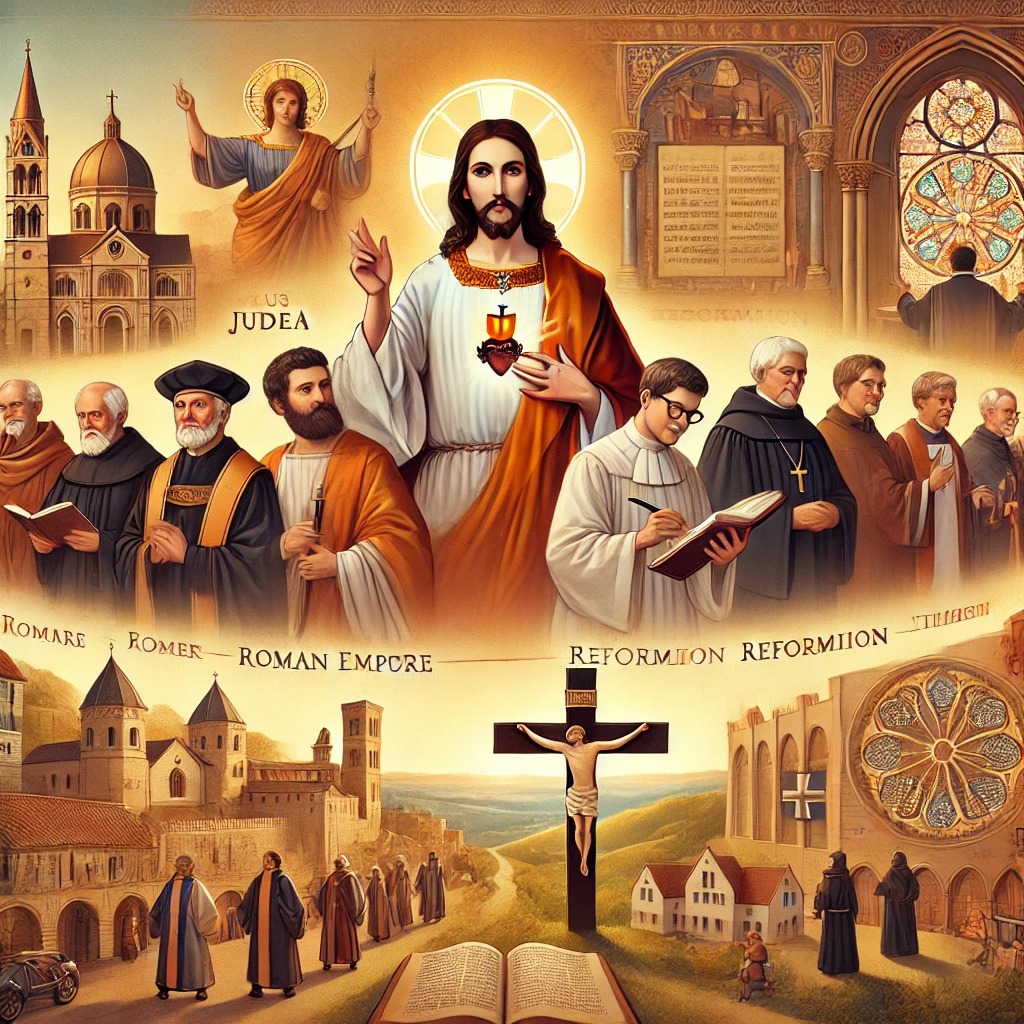
Christianity, one of the world’s major religions, has a rich history marked by significant events and profound beliefs. Originating from the teachings of Jesus of Nazareth, Christianity has evolved through centuries, shaping cultures and societies. This article explores key events in Christian history, core beliefs, the evolution of the Catholic Church, influential figures, and comparisons with Judaism to provide a comprehensive understanding of Christianity’s journey.
What are the Key Events in the History of Christianity?
How did the Birth of Jesus Influence Christianity?
The birth of Jesus, celebrated by Christians worldwide, marks the beginning of a new era in history. His arrival in Nazareth, as the prophesied Messiah, gave rise to the Christian faith. This event, detailed in the New Testament, established the foundation for Jesus’ teachings and the early church. The significance of Jesus’ birth is not just in the event itself but in the transformative message it carried, emphasizing that God had sent His son for the salvation of humanity. As believers began to understand the implications of his birth, it became a central tenet in the Christian tradition, influencing countless lives and shaping the calendar with celebrations like Christmas.
The birth of Jesus of Nazareth heralded a pivotal moment that would forever alter the course of history. It was not merely an event marked by a star over Bethlehem; it symbolized the initiation of a divine plan. Early Christians viewed his birth as the fulfillment of Old Testament prophecies, signaling the arrival of a savior destined to redeem humanity from original sin. Consequently, the importance of this event resonates throughout Christian doctrine. Celebrated by millions, the Nativity underscores the essence of Christianity, where believers embrace the notion that through Jesus, God’s love and grace are accessible to all, inviting people to partake in a new covenant that transcends the boundaries of Judaism and pagan traditions. Thus, the birth of Jesus stands as a cornerstone in the faith, inspiring generations to reflect on the profound implications of this miraculous event.
What Role Did the Resurrection Play in Early Christian Beliefs?
The resurrection of Jesus is considered the cornerstone of Christian faith, profoundly influencing early Christian beliefs. After his crucifixion, the resurrection event, which occurred 50 days later during Pentecost, affirmed Jesus’ divine nature and victory over death. This pivotal moment was not only a testament to Jesus’ teachings but also provided hope and assurance for believers regarding eternal life. The resurrection solidified the belief in the gospel message, compelling the apostles and early followers to spread Jesus’ teachings as they experienced the transformative power of his resurrection. This event shaped the core of Christian doctrine, emphasizing faith in Christ as central to salvation.
The resurrection stands as a defining moment in the history of Christianity, fundamentally shaping the beliefs of early followers. Following the death of Jesus, the news of his resurrection ignited a fervor among his disciples, who perceived it as a divine affirmation of Jesus’ identity as the Messiah. The resurrection not only confirmed the truth of Jesus’ message but also instilled a profound sense of hope within the early church. This event became a central theme within their sermons and writings, as the apostles, particularly the Apostle Paul, articulated its significance in the context of salvation and eternal life. Consequently, the resurrection catalyzed the spread of Christianity beyond Jewish communities, attracting Gentiles and establishing a distinct identity for the burgeoning faith. The belief in the resurrection remains a fundamental aspect of Christian creed, viewed as the ultimate victory over sin and death, assuring believers of their own resurrection and eternal communion with God.
What Were the Major Events During the Reformation?
The Reformation, occurring in the 16th century, represented a critical juncture in the history of Christianity, challenging the practices of the Catholic Church. Key figures like Martin Luther and John Calvin emerged, advocating for a return to biblical teachings and emphasizing salvation through faith alone. The Reformation led to the establishment of Protestantism, which rejected certain Catholic doctrines and introduced new interpretations of the Holy Bible. This movement not only transformed the religious landscape but also prompted significant socio-political changes, as the quest for religious reform intersected with issues of authority and governance. The events during the Reformation ignited fervent debates regarding orthodoxy, heresy, and the essence of Christian faith.
The Reformation stands as one of the most transformative movements in the history of Christianity, marked by a series of events that fundamentally reshaped the religious landscape of Europe. Initiated by Martin Luther’s 95 Theses, which criticized the Catholic Church’s practices, the Reformation sparked widespread discourse on the nature of salvation, grace, and the authority of Scripture. This period saw the emergence of various Protestant sects, each advocating for differing interpretations of Jesus’ teachings, which created a rich tapestry of beliefs that contrasted sharply with the Roman Catholic Church’s established orthodoxy. The Reformation also catalyzed societal shifts, influencing education, politics, and individual liberties, as people began to question traditional authority and seek personal relationships with God. The consequences of these events reverberated throughout history, paving the way for modern Christianity and establishing a legacy that continues to impact religious thought and practice even in contemporary times.
What Are the Core Beliefs of Christianity?
What is the Essence of Christianity?
The essence of Christianity revolves around the belief in one God and the teachings of Jesus Christ. Central to this faith is the understanding that Jesus’ life, death, and resurrection offer redemption from sin and the promise of eternal life. Christianity emphasizes love, grace, and forgiveness as core tenets, encouraging believers to embody these values in their daily lives. Additionally, the teachings of Jesus, as recorded in the New Testament, provide a moral framework that guides the conduct of Christians, shaping their interactions with others and their relationship with God. The essence of Christianity is not merely a set of beliefs but a transformative way of life rooted in the teachings of Christ and the love of God.
The essence of Christianity can be encapsulated in the profound relationship between believers and God, facilitated through the teachings of Jesus Christ. At its core, Christianity asserts the belief in a singular, omnipotent God who seeks a personal relationship with humanity. This relationship is made possible through the redemptive work of Jesus, whose life and teachings reveal the nature of divine love and grace. The call to love one another, as articulated in Jesus’ Sermon on the Mount, underscores the moral imperative that guides Christian conduct. Furthermore, the essence of Christianity includes the acknowledgment of original sin and the necessity for salvation, which Jesus offers freely to all who believe. This transformative message invites individuals to embrace a new identity in Christ, fostering a sense of community and purpose among believers. Ultimately, the essence of Christianity is a call to live out one’s faith actively, reflecting the love and teachings of Jesus in every aspect of life.
How Do the Teachings of Jesus Shape Christian Faith?
The teachings of Jesus Christ serve as the foundation for Christian faith, providing guidance on how to live a life that reflects God’s love and grace. Central to his message is the concept of love—love for God and love for one’s neighbor—which is echoed throughout the New Testament. Jesus’ parables and sermons, such as the Sermon on the Mount, illustrate profound truths about humility, compassion, and forgiveness. These teachings encourage believers to cultivate a spirit of service and to seek justice for the marginalized. By embodying these principles, Christians strive to reflect Christ’s character in their daily lives, fostering a community rooted in faith and love.
The teachings of Jesus are paramount in shaping the Christian faith, as they provide both a moral compass and a theological foundation for believers. Central to his message is the command to love—love for God, self, and others—serving as a guiding principle for Christian living. Through parables and teachings, Jesus conveyed essential truths about humility, forgiveness, and the nature of the Kingdom of God. The Sermon on the Mount, in particular, encapsulates the ethical dimensions of Jesus’ teachings, challenging believers to rise above societal norms and embody a radical love that transcends boundaries. Additionally, Jesus’ emphasis on compassion and service to others compels Christians to engage actively in social justice and community outreach. By adhering to Jesus’ teachings, Christians cultivate a faith that is not merely intellectual but profoundly transformative, impacting their interactions with others and their commitment to living out the gospel message in a world that often mirrors the challenges faced by Jesus and his early followers.
What is the Significance of the Gospel in Christianity?
The gospel, meaning “good news,” holds immense significance within Christianity as it encapsulates the core message of Jesus Christ. The four gospels in the New Testament—Matthew, Mark, Luke, and John—chronicle Jesus’ life, teachings, death, and resurrection, forming the foundation of Christian belief. The gospel message emphasizes salvation through faith in Jesus, offering hope and assurance of eternal life. It serves as a rallying cry for evangelism, motivating believers to share the transformative power of Christ with others. The significance of the gospel extends beyond individual salvation; it calls for the establishment of God’s kingdom on earth, encouraging Christians to engage in acts of love, justice, and reconciliation.
The gospel is central to the Christian faith, serving as the foundation upon which believers build their understanding of salvation and God’s redemptive plan. The term “gospel” signifies the good news of Jesus Christ, which is meticulously conveyed through the accounts of the four evangelists in the New Testament. Each gospel presents a unique perspective on Jesus’ life and mission, collectively affirming the significance of his teachings, sacrificial death, and triumphant resurrection. This message of hope and redemption is not only vital for individual believers but also serves as a catalyst for communal transformation. The gospel compels Christians to embrace their identity as ambassadors of Christ, sharing the good news with the world around them. Moreover, it challenges believers to live in accordance with Jesus’ teachings, advocating for justice, mercy, and love in a society often marked by division and strife. In essence, the gospel encapsulates the heart of Christianity, inviting all into a transformative relationship with God through faith in Jesus Christ.
How Did the Catholic Church Evolve Over Time?
What Were the Impacts of the Crusades on the Catholic Church?
The Crusades, a series of religious wars initiated in the late 11th century, had profound impacts on the Catholic Church and Christianity as a whole. Aimed at reclaiming the Holy Land from Muslim control, the Crusades mobilized thousands of Christians under the banner of faith. While they initially sought to unite Christians against a common enemy, the Crusades also revealed deep divisions within Christendom and led to increased tensions between different sects of Christianity, particularly between the Catholic Church and Eastern Orthodox Christians. Furthermore, the Crusades significantly enhanced the power and influence of the Catholic Church, as popes played key roles in motivating and directing these military campaigns, thereby solidifying their authority in medieval Europe.
The Crusades marked a significant chapter in the history of the Catholic Church, profoundly influencing its structure, authority, and relationship with the broader Christian community. Initiated as a response to perceived threats to Christendom, the Crusades were framed as holy wars aimed at reclaiming Jerusalem and the surrounding areas deemed sacred by Christians. As armies of believers, inspired by the call of the popes, marched towards the Holy Land, the Catholic Church experienced a surge in prestige and power, positioning itself as a central authority in a fragmented medieval society. However, the Crusades also exposed rifts within Christianity, particularly between the Roman Catholic Church and Eastern Orthodox Church, leading to enduring tensions and distrust. Additionally, the consequences of the Crusades extended beyond the battlefield, influencing trade, cultural exchanges, and the spread of ideas between East and West. Ultimately, while the Crusades sought to fortify Christian dominion, they also sowed seeds of conflict that would shape Christian relations for centuries to come.
What Caused the Schism Between the Roman Catholic and Eastern Orthodox Churches?
The schism between the Roman Catholic and Eastern Orthodox Churches, formalized in 1054, resulted from a complex interplay of theological, political, and cultural factors. Disagreements over the authority of the pope, the nature of the Holy Spirit, and various liturgical practices created significant divides between the two branches of Christianity. The growing power of the papacy, particularly in the West, contrasted sharply with the decentralized nature of the Eastern Church. Additionally, cultural differences and political tensions contributed to mutual mistrust, culminating in the mutual excommunication of leaders, which solidified the schism. This division has persisted for centuries, shaping the development of distinct Christian identities in the West and East.
The schism that occurred in 1054 between the Roman Catholic and Eastern Orthodox Churches stands as one of the most significant divisions in the history of Christianity. Rooted in a combination of theological disagreements and political tensions, the schism was characterized by disputes over the authority of the pope, with the Roman Catholic Church asserting the supremacy of the papacy, while the Eastern Orthodox Church maintained a more decentralized structure of governance. Theological disagreements, such as the inclusion of the filioque clause in the Nicene Creed, further exacerbated tensions between the two branches. Additionally, cultural differences and historical conflicts, particularly surrounding the Crusades and territorial disputes, deepened mistrust. The culmination of these factors led to mutual excommunications by the leaders of both churches, effectively formalizing the split. This schism not only shaped the trajectory of Christianity but also laid the groundwork for distinct identities that continue to influence Christian thought and practice in the modern world.
How Did the Protestant Reformation Change the Catholic Church?
The Protestant Reformation, ignited in the 16th century by figures like Martin Luther, profoundly altered the landscape of Christianity and the Catholic Church. This movement challenged the Church’s practices, particularly the sale of indulgences, and emphasized the importance of Scripture over tradition. Luther’s 95 Theses sparked debates that ultimately led to the formation of various Protestant sects, fundamentally questioning the authority of the pope and the nature of salvation. The Catholic Church responded with reforms of its own, known as the Counter-Reformation, which sought to address some of the criticisms raised by Protestant reformers while reaffirming its core doctrines. The Reformation not only reshaped the Catholic Church but also set the stage for diverse expressions of Christian faith.
The Protestant Reformation stands as a watershed moment in the history of Christianity, catalyzing significant changes within the Catholic Church and the broader Christian community. Sparked by Martin Luther’s courageous challenges to Church practices, particularly regarding the sale of indulgences, the Reformation brought to light deep-seated issues of corruption and the need for reform within the Church. As Luther and other reformers emphasized the primacy of Scripture and the accessibility of salvation through faith alone, they laid the groundwork for the emergence of Protestantism and a variety of new sects that would diverge from Catholic orthodoxy. In response, the Catholic Church initiated the Counter-Reformation, a movement aimed at addressing the concerns raised by Protestants while reinforcing its own doctrines and practices. This period saw the establishment of new religious orders, the reaffirmation of the importance of the sacraments, and a renewed focus on education and missionary work. The Reformation ultimately transformed the religious landscape, fostering a diversity of beliefs and practices that continue to shape Christianity today.
Who Were the Key Figures in Early Christianity?
What Contributions Did the Apostle Paul Make to Christianity?
The Apostle Paul, originally known as Saul of Tarsus, played a crucial role in the development and spread of early Christianity. His conversion experience on the road to Damascus transformed him from a persecutor of Christians to one of its most fervent advocates. Paul’s missionary journeys across the Roman Empire were instrumental in establishing new Christian communities, particularly among Gentiles, and his letters, which form a significant portion of the New Testament, provided theological insights that shaped Christian doctrine. His emphasis on salvation through faith and grace resonated profoundly, encouraging believers to embrace the teachings of Jesus and fostering a sense of unity among diverse groups. Paul’s contributions were pivotal in defining the beliefs and practices of early Christianity, helping to establish a framework for Christian orthodoxy.
The Apostle Paul stands out as one of the most influential figures in early Christianity, whose contributions were foundational in shaping the trajectory of the faith. Initially a vehement opponent of Christianity, his dramatic conversion on the road to Damascus marked a pivotal moment that transformed him into an ardent advocate for the gospel. Over the course of his missionary journeys, Paul traveled extensively throughout the Roman Empire, establishing numerous Christian communities and preaching the message of Jesus Christ to both Jews and Gentiles. His letters, often referred to as epistles, constitute a significant portion of the New Testament and delve into a range of theological topics, including grace, faith, and the nature of the Church. Through his writings, Paul articulated key doctrines that helped define early Christian beliefs, emphasizing the importance of faith in Christ as the means of salvation. His efforts to bridge cultural divides and promote inclusivity within the early church laid the groundwork for the global nature of Christianity, making his contributions enduringly relevant to the faith’s development.
How Did Evangelists Spread the Teachings of Jesus?
The role of evangelists was pivotal in the spread of Jesus’ teachings throughout the early Christian communities. Individuals like Matthew, Mark, Luke, and John, known as the four evangelists, were instrumental in documenting the life and teachings of Jesus in the gospels. Their writings not only preserved Jesus’ message but also made it accessible to diverse audiences across different regions. Evangelists traveled extensively, sharing the good news of salvation and encouraging believers to live according to Jesus’ teachings. This grassroots movement facilitated the growth of Christianity, as evangelists fostered communities of faith that emphasized love, compassion, and the call to discipleship.
Evangelists played a vital role in disseminating the teachings of Jesus, fundamentally shaping the early Christian landscape. The four evangelists—Matthew, Mark, Luke, and John—were tasked with chronicling the life, ministry, and message of Jesus, ensuring that his teachings were preserved for future generations. Their gospels provided a narrative framework that not only detailed the events of Jesus’ life but also conveyed the significance of his teachings on love, forgiveness, and righteousness. Beyond their written accounts, evangelists engaged in active missionary work, traveling to various regions to preach the gospel and establish communities of faith. This grassroots movement was characterized by a passionate commitment to sharing the good news, often in the face of persecution and adversity. By fostering relationships within diverse cultural contexts, evangelists were able to adapt Jesus’ message to resonate with different audiences, promoting an understanding of Christianity that transcended ethnic and social boundaries. Consequently, the efforts of these early evangelists were instrumental in the rapid expansion of Christianity, laying the groundwork for a faith that would eventually become a global phenomenon.
FAQ: Biography and History of Christianity: Key Events and Beliefs
What is Christianity?
Christianity is a major world religion founded on the teachings of Jesus of Nazareth. It emphasizes beliefs in one God, salvation through Jesus Christ, and the transformative power of love, grace, and forgiveness.
Key Events in the History of Christianity
What are the most significant events in Christian history?
- The Birth of Jesus: Marks the beginning of Christianity, celebrated as Christmas.
- The Resurrection: Affirms Jesus’ divine nature and victory over death, central to Christian faith.
- The Reformation: A 16th-century movement that led to the establishment of Protestantism.
How did the birth of Jesus influence Christianity?
The birth of Jesus fulfilled Old Testament prophecies, establishing him as the Messiah. It symbolizes the start of God’s plan for humanity’s salvation and is celebrated worldwide through traditions like Christmas.
What role did the resurrection play in early Christian beliefs?
The resurrection confirmed Jesus’ teachings, provided hope for eternal life, and compelled early Christians to spread the gospel, making it a cornerstone of Christian doctrine.
What were the major events during the Reformation?
The Reformation, sparked by Martin Luther’s 95 Theses, challenged Catholic practices, leading to the rise of Protestant sects. It emphasized faith over tradition and reshaped religious and political landscapes.
Core Beliefs of Christianity
What is the essence of Christianity?
Christianity centers on belief in one God, the life and teachings of Jesus Christ, and the promise of redemption through his death and resurrection. Love, grace, and forgiveness are its core tenets.
How do the teachings of Jesus shape Christian faith?
Jesus’ teachings, such as love for God and neighbor, humility, and forgiveness, guide Christian behavior and moral values. Parables like the Good Samaritan and the Sermon on the Mount illustrate these principles.
What is the significance of the gospel in Christianity?
The gospel, meaning “good news,” conveys Jesus’ life, death, and resurrection. It provides the foundation for salvation, inspires evangelism, and calls for acts of love, justice, and reconciliation.
The Catholic Church and Its Evolution
What were the impacts of the Crusades on the Catholic Church?
The Crusades enhanced the Catholic Church’s influence but exposed divisions within Christianity. They also contributed to cultural exchanges between East and West, shaping medieval European society.
What caused the schism between the Roman Catholic and Eastern Orthodox Churches?
The schism of 1054 arose from theological disputes, cultural differences, and political tensions, including debates over papal authority and liturgical practices. Mutual excommunications formalized the split.
How did the Protestant Reformation change the Catholic Church?
The Reformation led to the creation of Protestant sects and prompted the Catholic Counter-Reformation, which addressed corruption and reaffirmed core doctrines.
Influential Figures in Christianity
What contributions did the Apostle Paul make to Christianity?
Paul spread Christianity through missionary journeys and writings, emphasizing salvation through faith. His letters, included in the New Testament, shaped early Christian theology and practices.
How did evangelists spread the teachings of Jesus?
Evangelists like Matthew, Mark, Luke, and John preserved Jesus’ teachings in the gospels and spread them through missionary work. Their efforts fostered the growth of Christian communities across regions.
Comparisons and Broader Context
How does Christianity compare to Judaism?
Christianity shares roots with Judaism, including belief in one God and reverence for the Old Testament. However, it diverges on beliefs about Jesus as the Messiah and the nature of salvation.
What are the primary differences among Christian denominations?
Denominations differ in theology, governance, and worship practices. For example, Catholics emphasize tradition and sacraments, while Protestants focus on Scripture and personal faith.
Why Study Christian History and Beliefs?
Understanding the history and beliefs of Christianity offers insight into its profound influence on culture, ethics, and global history, fostering a deeper appreciation for its spiritual and societal contributions.




